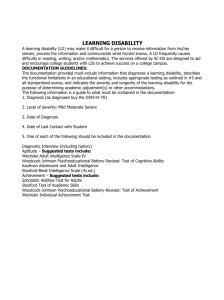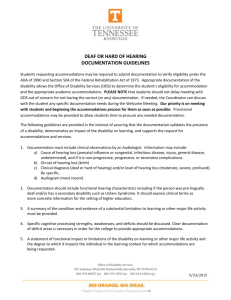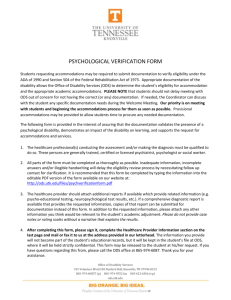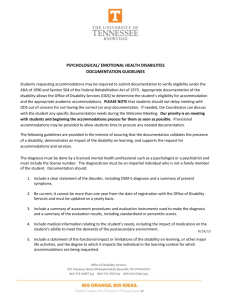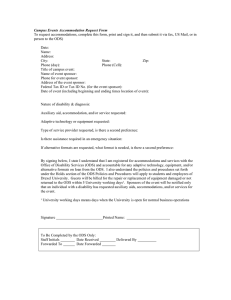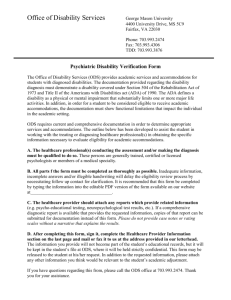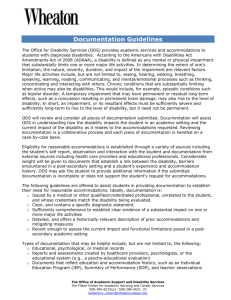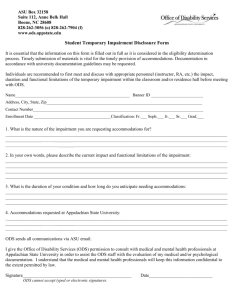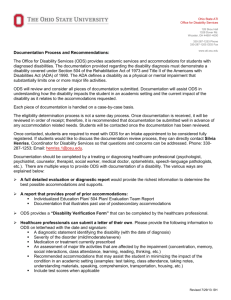acquired/ traumatic brain injuries
advertisement
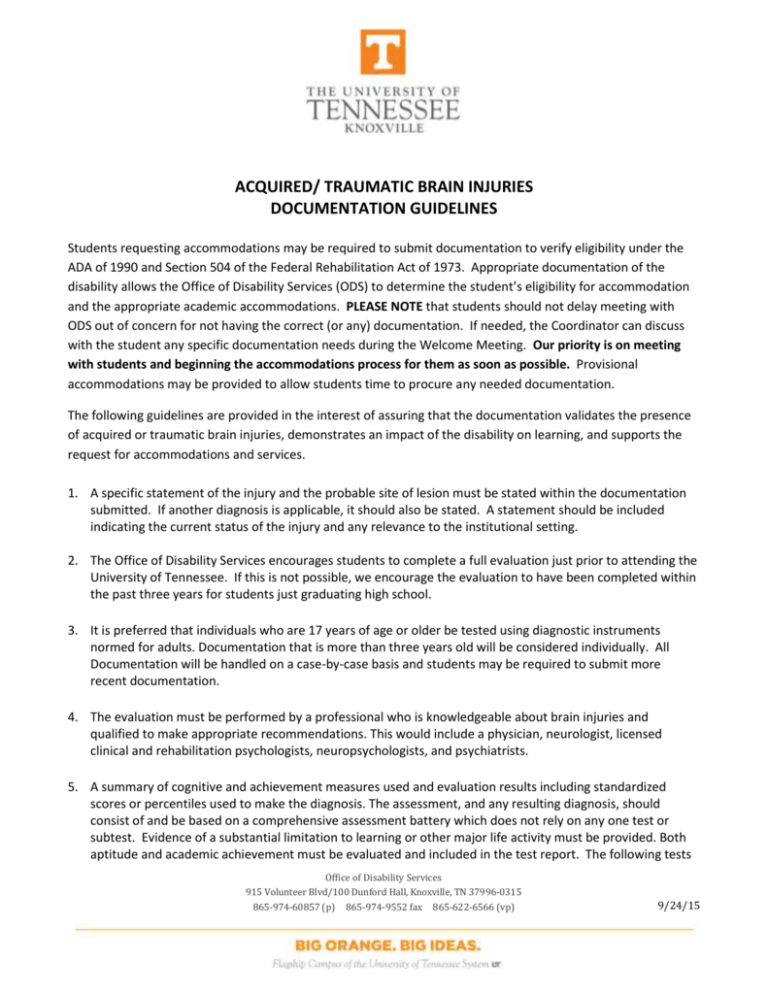
ACQUIRED/ TRAUMATIC BRAIN INJURIES DOCUMENTATION GUIDELINES Students requesting accommodations may be required to submit documentation to verify eligibility under the ADA of 1990 and Section 504 of the Federal Rehabilitation Act of 1973. Appropriate documentation of the disability allows the Office of Disability Services (ODS) to determine the student’s eligibility for accommodation and the appropriate academic accommodations. PLEASE NOTE that students should not delay meeting with ODS out of concern for not having the correct (or any) documentation. If needed, the Coordinator can discuss with the student any specific documentation needs during the Welcome Meeting. Our priority is on meeting with students and beginning the accommodations process for them as soon as possible. Provisional accommodations may be provided to allow students time to procure any needed documentation. The following guidelines are provided in the interest of assuring that the documentation validates the presence of acquired or traumatic brain injuries, demonstrates an impact of the disability on learning, and supports the request for accommodations and services. 1. A specific statement of the injury and the probable site of lesion must be stated within the documentation submitted. If another diagnosis is applicable, it should also be stated. A statement should be included indicating the current status of the injury and any relevance to the institutional setting. 2. The Office of Disability Services encourages students to complete a full evaluation just prior to attending the University of Tennessee. If this is not possible, we encourage the evaluation to have been completed within the past three years for students just graduating high school. 3. It is preferred that individuals who are 17 years of age or older be tested using diagnostic instruments normed for adults. Documentation that is more than three years old will be considered individually. All Documentation will be handled on a case-by-case basis and students may be required to submit more recent documentation. 4. The evaluation must be performed by a professional who is knowledgeable about brain injuries and qualified to make appropriate recommendations. This would include a physician, neurologist, licensed clinical and rehabilitation psychologists, neuropsychologists, and psychiatrists. 5. A summary of cognitive and achievement measures used and evaluation results including standardized scores or percentiles used to make the diagnosis. The assessment, and any resulting diagnosis, should consist of and be based on a comprehensive assessment battery which does not rely on any one test or subtest. Evidence of a substantial limitation to learning or other major life activity must be provided. Both aptitude and academic achievement must be evaluated and included in the test report. The following tests Office of Disability Services 915 Volunteer Blvd/100 Dunford Hall, Knoxville, TN 37996-0315 865-974-60857 (p) 865-974-9552 fax 865-622-6566 (vp) ods.utk.edu 9/24/15 are considered acceptable: Aptitude: WAIS-III; Stanford-Binet IV; Woodcock-Johnson Psychoeducational Battery Revised: Test of Cognitive Ability Academic Achievement: Woodcock-Johnson Psychoeducational Battery -Revised: Test of Achievement; Wechsler Individual Achievement Test (WIAT); Stanford Test of Academic Skills (TASK); Scholastic Abilities Test for Adults (SATA) The Wide Range Achievement Test-3 (WRAT-3) is not a comprehensive measure of achievement and therefore should not be used as a sole measure of achievement.) 6. Specific cognitive processing strengths, weaknesses, and deficits should be discussed. Clear documentation of deficit areas is necessary in order for the college to provide appropriate accommodations. The documentation should discuss the following processing areas: Visual spatial abilities Memory (auditory and visual; short-term and long term) Fine Motor / dexterity ( speed/ sequence of motor patterns) Executive functions (verbal and nonverbal reasoning). It is also helpful to know about the student’s cognitive flexibility and automaticity with cognitive tasks. Selective attention / perception ( auditory and visual) 7. A comprehensive evaluation by a speech-pathologist to determine oral language skills should be included. Formal instruments or an informal analysis of a language sample are appropriate. 8. Social-emotional status should be assessed and discussed. Formal assessment instruments and / or clinical interview are appropriate. If applicable, a mental health diagnosis should be clearly stated, using the DSM5. 9. A statement of functional impact or limitations of the disability on learning or other major life activity and the degree to which it impacts the individual in the learning context for which accommodations are being requested. 10. Medical information relating to the student's needs to include the impact of medication on the student's ability to meet the demands of the postsecondary environment. 11. The documentation must include the following information: Names of the assessment instruments used Quantitative and qualitative information which supports the diagnosis The areas of educational impact and the severity of the condition Recommendations for prescriptive treatments Notation of medications prescribed, if any, and potential impact on learning Additional observations or recommendations which could assist us in adequately serving the student The names, titles, addresses, and phone numbers of the evaluator(s), as well as date(s) of testing 9/24/15 Please note that in reviewing the specific accommodation requested by the student or recommended by the physician/evaluator, ODS may find that while a recommendation is clinically supported, it is not the most appropriate accommodation given the requirements of a particular student’s academic program. In addition, ODS may also propose clinically supported accommodations that would be appropriate and useful for the student, but which neither the student nor the evaluator have requested. The aforementioned guidelines are provided so that ODS can respond appropriately to the individual needs of the student. ODS reserves the right to determine eligibility for services based on the quality of the submitted documentation. Documentation may need to be updated or augmented in order to be reviewed more fully. ALL DOCUMENTATION IS CONFIDENTIAL 9/24/15
